Overview
Choosing the right audit engagement software is crucial for accounting managers, as it significantly enhances operational efficiency, improves client communication, and ensures compliance with regulations. Advanced software solutions, such as Glasscubes, not only address current challenges but also lead to remarkable time savings and increased accuracy. Firms utilizing these tools have reported a staggering 288-hour reduction in workload during tax seasons, alongside a 50% decrease in response times. This highlights the transformative impact that effective software can have on audit processes.
By investing in the right technology, accounting managers can:
- Streamline their operations
- Enhance client satisfaction
- Stay ahead of regulatory demands
The time to act is now—embrace the future of auditing with Glasscubes and witness the difference it can make in your practice.
Introduction
In the dynamic realm of accounting, selecting the right audit engagement software transcends a mere technical choice; it stands as a strategic imperative that can fundamentally transform the efficiency and effectiveness of audit processes.
As technology rapidly evolves, accounting firms are increasingly embracing innovative solutions like Glasscubes to streamline operations, enhance client interactions, and ensure compliance with ever-changing regulations.
In navigating the complexities of modern auditing, it is essential for firms to grasp the critical features and advantages these software solutions offer.
This article explores the transformative impact of audit engagement software, highlighting key functionalities that drive productivity, improve accuracy, and foster collaboration, ultimately positioning firms for success in a competitive landscape.
The Importance of Choosing the Right Audit Engagement Software
The selection of audit engagement software is pivotal in shaping the effectiveness of examination procedures within accounting firms. For accounting managers, the right tools are essential for minimising manual errors, enhancing client communication, and ensuring adherence to regulatory compliance standards. Advanced audit engagement software has demonstrated its value, with firms reporting substantial time savings and significant improvements in audit accuracy.
A recent case study revealed that users of innovative tools saved as much as 288 hours during a single tax season, showcasing the transformative potential of effective software solutions. Testimonials from users highlight that Glasscubes has facilitated faster customer responses and increased transparency by consolidating all information within a secure workspace. Gopikrishna Butaka, Manager of Information Systems Review at the State Bank of India, aptly states,
The characteristics of examination are changing drastically with each passing day, with new technology elements either totally replacing or redesigning old methodology.
This underscores the necessity for auditors to remain informed about the latest audit engagement software to maintain competitiveness. Initially, users, including audit managers, expressed concerns regarding user engagement with the new software due to their long-standing reliance on email communication. However, they soon discovered that users engaged thoroughly with the platform, appreciating the ease of uploading and accessing information.
By utilising the platform, users have reported enhanced customer engagement, with clients valuing the ability to easily view outstanding information. This has resulted in a 38% increase in response rates and a 50% reduction in response times. The features of Glasscubes, such as automatic reminders and secure information sharing, play a critical role in these enhancements. By prioritising the right tools like audit engagement software, accounting managers can significantly elevate their team’s productivity and enhance customer satisfaction, positioning their firms for success in an increasingly competitive landscape where emerging technologies can either widen or bridge the gap between large and smaller firms.
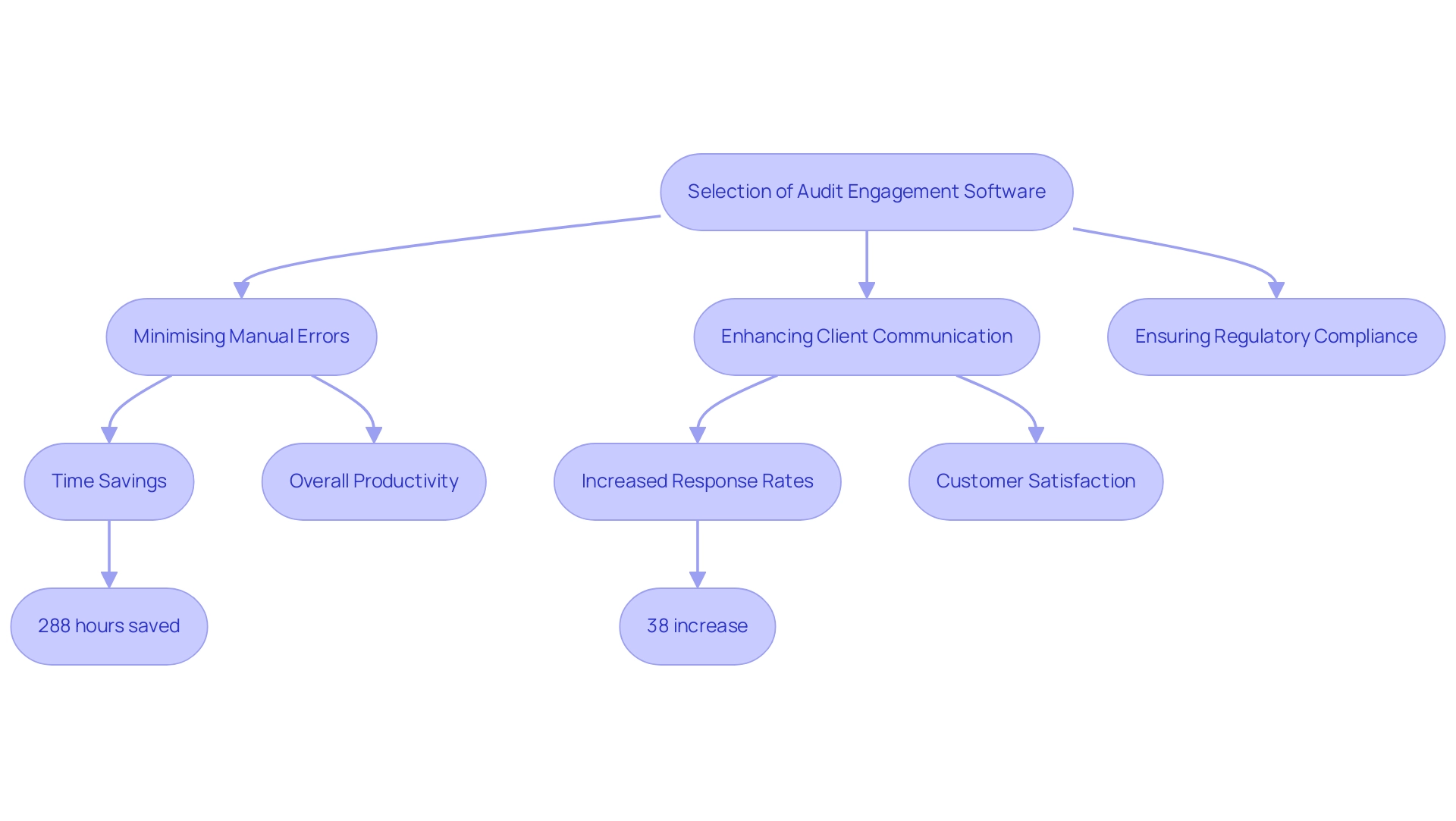
Essential Features to Look for in Audit Engagement Software
When selecting audit engagement tools, accounting managers must prioritise several essential features that can significantly enhance operational efficiency and client engagement.
- User-Friendly Interface: An intuitive design is crucial, minimising the training required for staff and accelerating adoption and productivity. Glasscubes exemplifies this with its effortless onboarding experience, requiring no formal training and offering personalised setup assistance. Furthermore, the integration capabilities of the audit engagement software should allow seamless integration with existing accounting systems, ensuring a smooth flow of data and reducing the risk of errors during data entry.
- Audit Engagement Software: This platform provides essential features that enable real-time communication between auditors and clients, enhancing collaboration through automated reminders and centralised correspondence for each request, facilitating prompt feedback and nurturing stronger relationships. Unlike traditional email, which often leads to misplaced responses and a lack of visibility on outstanding requests, this platform keeps all correspondence organised within each audit request.
- Automated Reporting: The capability of audit engagement software to generate reports automatically not only saves time but also minimises errors, allowing teams to focus on analysis rather than data compilation. With the platform, users can easily track outstanding requests and queries with real-time visual progress reports.
- Automated Reminder Feature: This platform allows you to send up to 10 reminders on a simple schedule, or with advanced options, you can send an unlimited number of reminders with any frequency or on specific days of the year. This customisation helps indicate greater urgency for upcoming deadlines, ensuring timely responses from clients.
- Data Security: Compliance with GDPR and other relevant regulations is non-negotiable for safeguarding sensitive customer information in audit engagement software, reinforcing trust and accountability. Glasscubes ensures data security through secure, encrypted communications, alleviating concerns regarding data breaches and reinforcing customer confidence.
- Scalability: As companies expand, the application should handle a rising number of users and data without compromising performance.
By highlighting these attributes, accounting managers can guarantee they choose audit engagement software that addresses current needs while also facilitating future expansion. Notably, the global market for accounting applications is projected to reach $11.8 billion in the next eight years, underscoring the importance of investing in effective solutions. Moreover, case studies illustrate the tangible advantages of intuitive applications, with users indicating an impressive 288 hours saved in one tax season and a 40% rise in client response rates, significantly decreasing response times by up to 50%.
Additionally, with 80% of accounting executives believing that AI leads to competitive advantage, adopting advanced technologies like those available is essential for maintaining a competitive edge in the evolving landscape of accounting.
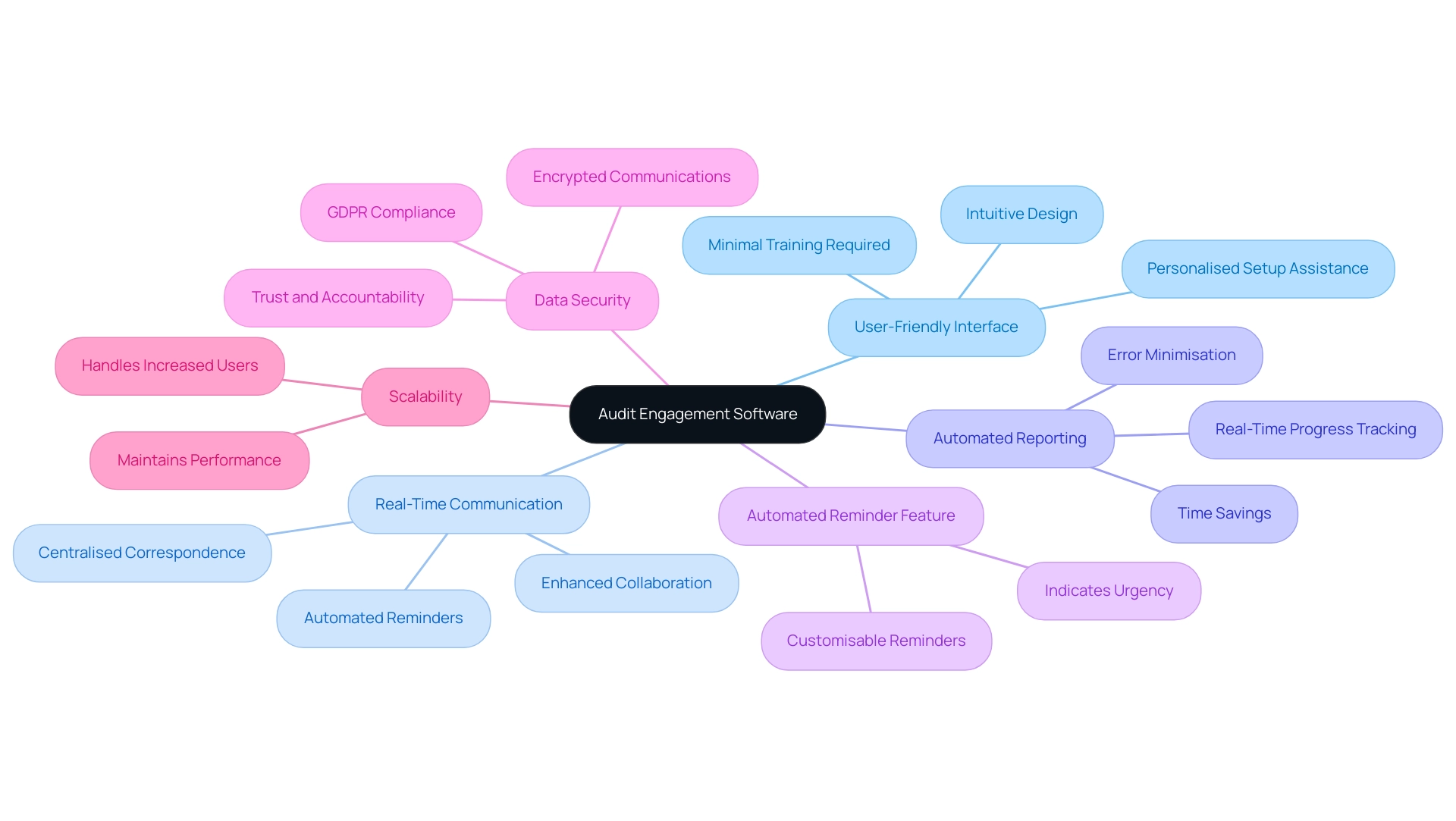
Advantages of Audit Engagement Software Over Traditional Methods
Audit engagement software revolutionises the auditing landscape for accounting firms, offering significant advantages over traditional methods. Notably, increased efficiency emerges as a primary benefit. By automating data collection and reporting processes through features like automated reminders and real-time reporting, firms can drastically reduce the time spent on manual tasks, liberating valuable resources for more strategic initiatives.
Statistics reveal that companies utilising contemporary assessment software experience impressive efficiency improvements, with many reporting an average reduction in evaluation cycle duration by up to 30%.
Furthermore, Glasscubes enhances accuracy by minimising human errors through fully encrypted data handling and structured workflows, ensuring consistent and reliable data capture. This aspect is crucial, as errors in evaluations can lead to severe consequences, including compliance issues and loss of client trust.
Recent findings indicate that companies using examination tools have experienced a 40% decrease in mistakes compared to conventional reviewing techniques. Enhanced collaboration is another key advantage facilitated by audit engagement software solutions. With the cloud-based platform, real-time communication and collaboration among team members is achievable, regardless of their physical locations.
This flexibility not only streamlines internal workflows but also cultivates a culture of transparency and teamwork, which is essential in today’s fast-paced business environment. Compliance is becoming increasingly vital for accounting firms, and numerous engagement tools, including audit engagement software, feature integrated compliance assessments. These capabilities assist firms in adhering to regulatory requirements more effectively, thereby mitigating risks associated with non-compliance.
With the average number of audits conducted per department at 86, ensuring compliance through automated checks is critical for maintaining operational integrity. Lastly, scalability is a significant advantage that audit engagement software offers over traditional methods. As companies grow and acquire more customers, traditional processes may falter under increased workloads.
In contrast, Glasscubes can effortlessly adapt to accommodate larger volumes of data and customer requests, ensuring that firms maintain their service quality as they expand. Glasscubes presents competitive pricing options, with monthly account fees starting at £120 and user licence fees beginning at £18, making it an accessible choice for firms of various sizes. Additionally, the platform includes comprehensive support packages, such as Bronze, Silver, and Gold options, ensuring that firms receive the necessary assistance for successful implementation and ongoing use.
By simplifying the assessment procedure and enhancing overall quality through features like task management, secure file sharing, and automated workflows, these technological solutions not only boost operational efficiency but also foster greater client trust and satisfaction—essential components for thriving in the competitive accounting sector. A case study on continuous verification practices illustrates this point, demonstrating how leveraging technology for more frequent monitoring can enhance quality, reduce errors, and enable timely identification of potential issues.
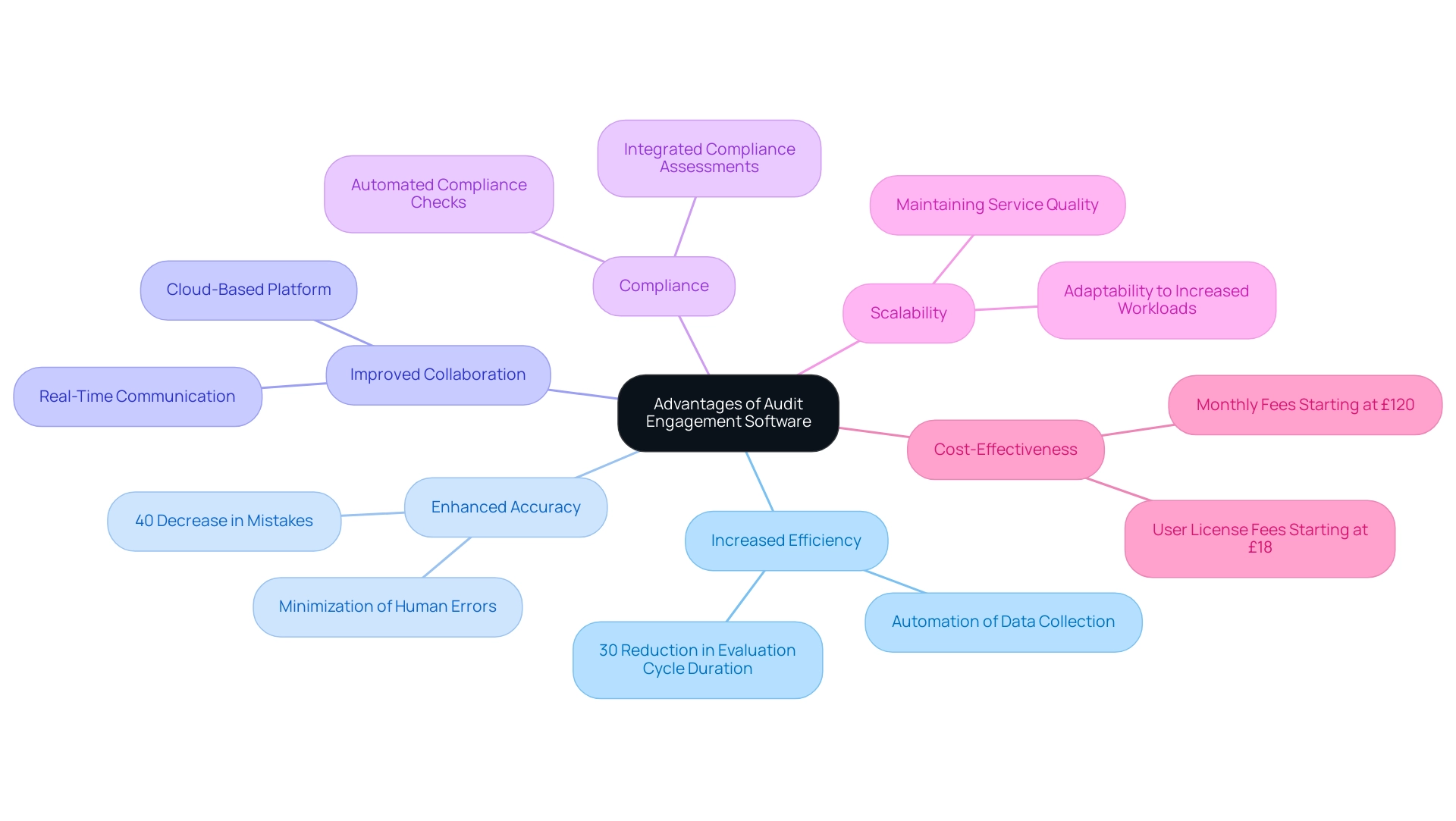
Integrating Audit Engagement Software with Existing Systems
Successfully integrating audit engagement software with existing systems requires careful consideration and a systematic approach. To facilitate this process, consider the following essential steps:
- Assess Current Systems: Begin by evaluating the existing applications and processes within your firm. This assessment will help identify key integration points where the new system can enhance current workflows.
- Choose Compatible Applications: Select audit engagement software specifically designed to integrate seamlessly with your existing systems, such as your ERP or accounting solutions. The software optimises workflows and enhances client satisfaction through features like automated reminders, allowing you to send an unlimited number of reminders on a customised schedule. This ensures timely notifications tailored to deadlines, ultimately increasing response rates.
- Plan the Integration Process: Develop a comprehensive integration plan that outlines each step of the process, including timelines, responsibilities, and resources needed. A well-structured plan mitigates risks and clarifies expectations for all team members.
- Test the Integration: Prior to full deployment, conduct thorough testing to verify that data flows correctly between systems and that all functionalities operate as expected. This step is vital for identifying potential issues before they affect daily operations.
- Train Staff: Provide extensive training for staff to familiarise them with the new programme and its integration with existing systems. Effective training minimises disruptions and helps team members adapt to new processes, ultimately enhancing operational efficiency.
By adhering to these steps, accounting managers can achieve a successful integration that not only improves operational efficiency but also enhances data management capabilities. With features like streamlined payroll management, this platform simplifies the request and transfer of payroll information, reducing workload and stress for accounting teams. This has demonstrated a 50% reduction in response times for firms that have adopted it.
As noted by experts in the field, adopting technology with a transformative mindset is essential:
But they really need to be saying, let’s use this technology to see how it can transform what we do, and do it better.
This mindset is especially pertinent when incorporating tools that enable firms to improve client interaction and streamline evaluation processes efficiently, thus preventing assessment disorder.
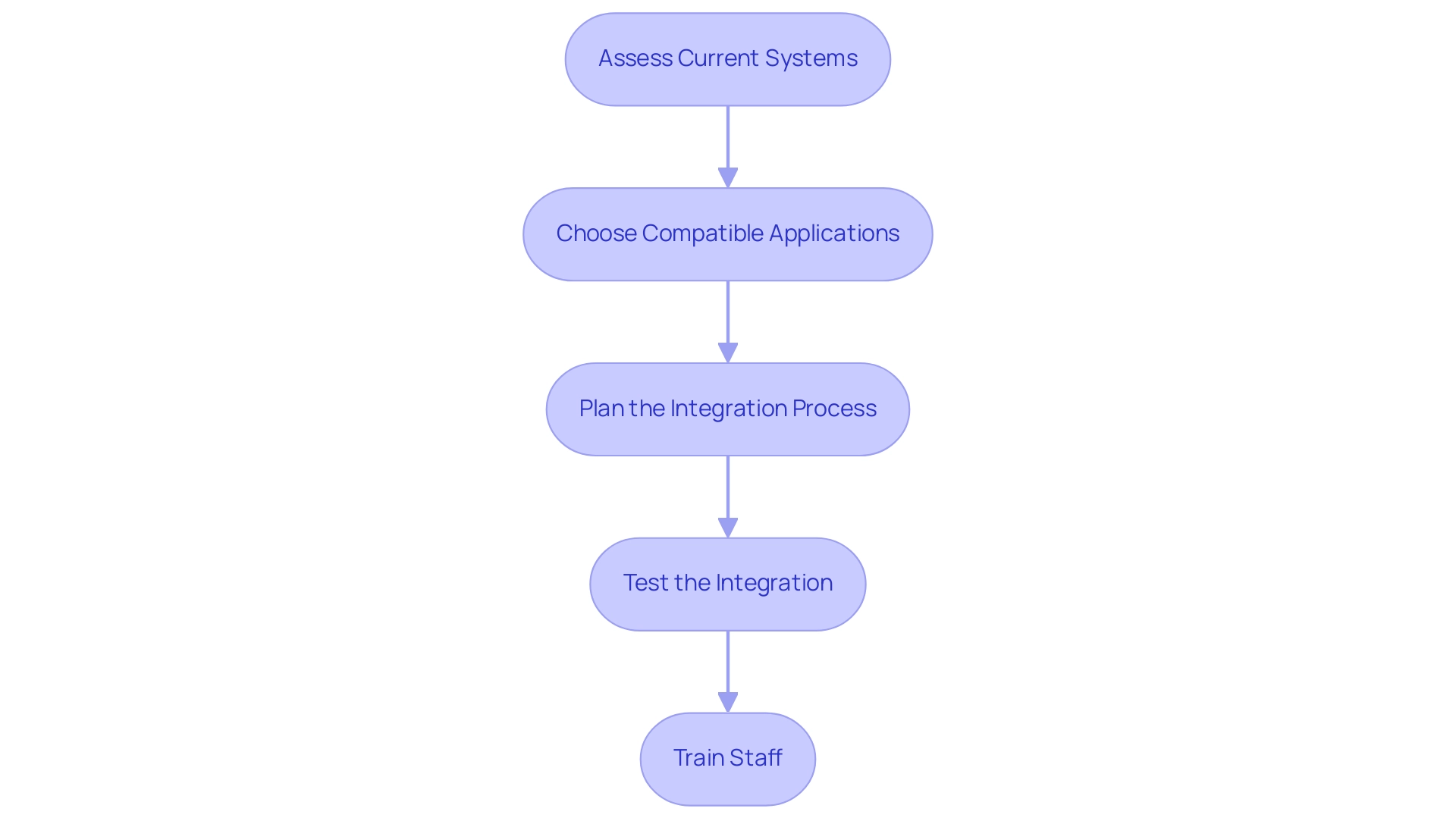
Overcoming Common Challenges in Audit Engagement with Software Solutions
Audit engagement presents several significant challenges that can hinder efficiency and effectiveness. Grasping these prevalent issues is vital for accounting managers aiming to improve their review processes.
- Data Overload: Auditors frequently contend with vast amounts of data, complicating the identification of pertinent information. Innovative audit engagement software solutions can mitigate this challenge by automating data analysis, thereby surfacing key insights that facilitate informed decision-making. This capability is particularly vital in today’s fast-paced environment, where timely and accurate information is paramount. Moreover, this platform allows for streamlined information gathering and storage, making previous years’ data readily accessible, which enhances the audit phase.
- Communication Gaps: Delays often arise from miscommunication between auditors and customers, which can stall progress and create frustration. Glasscubes addresses this issue by providing a centralised platform that fosters clear and efficient communication. As emphasised in a testimonial, the clarity provided by having all information in one location has significantly enhanced response times; individuals can view outstanding information they need to supply, minimising the necessity for follow-ups. This modern approach not only minimises misunderstandings but also enhances collaboration and efficiency. Moreover, characteristics such as automated notifications assist in keeping individuals informed and involved throughout the review process.
- Compliance Issues: The landscape of regulatory requirements is ever-evolving, making it difficult for firms to keep pace. Glasscubes includes compliance tracking functionalities, allowing companies to remain informed about changes and ensuring that evaluations are performed in line with the latest regulations. This proactive approach not only reduces risk but also enhances trust, as customers appreciate the secure and organised manner in which their information is handled.
- Resource Constraints: Limited resources, including personnel and budget, can significantly affect the effectiveness of examination engagements. By automating routine tasks and offering features such as real-time reporting and a dedicated user portal, this platform alleviates the burden of manual labour, enabling teams to focus on higher-value activities that require professional judgement and expertise.
By implementing robust audit engagement software solutions, accounting managers can effectively navigate these challenges, resulting in more streamlined and successful evaluations. Companies using this platform have noted an impressive 50% decrease in response times and a 40% rise in client engagement rates, showcasing the concrete advantages of contemporary technology in the evaluation process. Furthermore, with pricing options that include essential support packages, Glasscubes offers a comprehensive solution tailored to the needs of accounting firms.
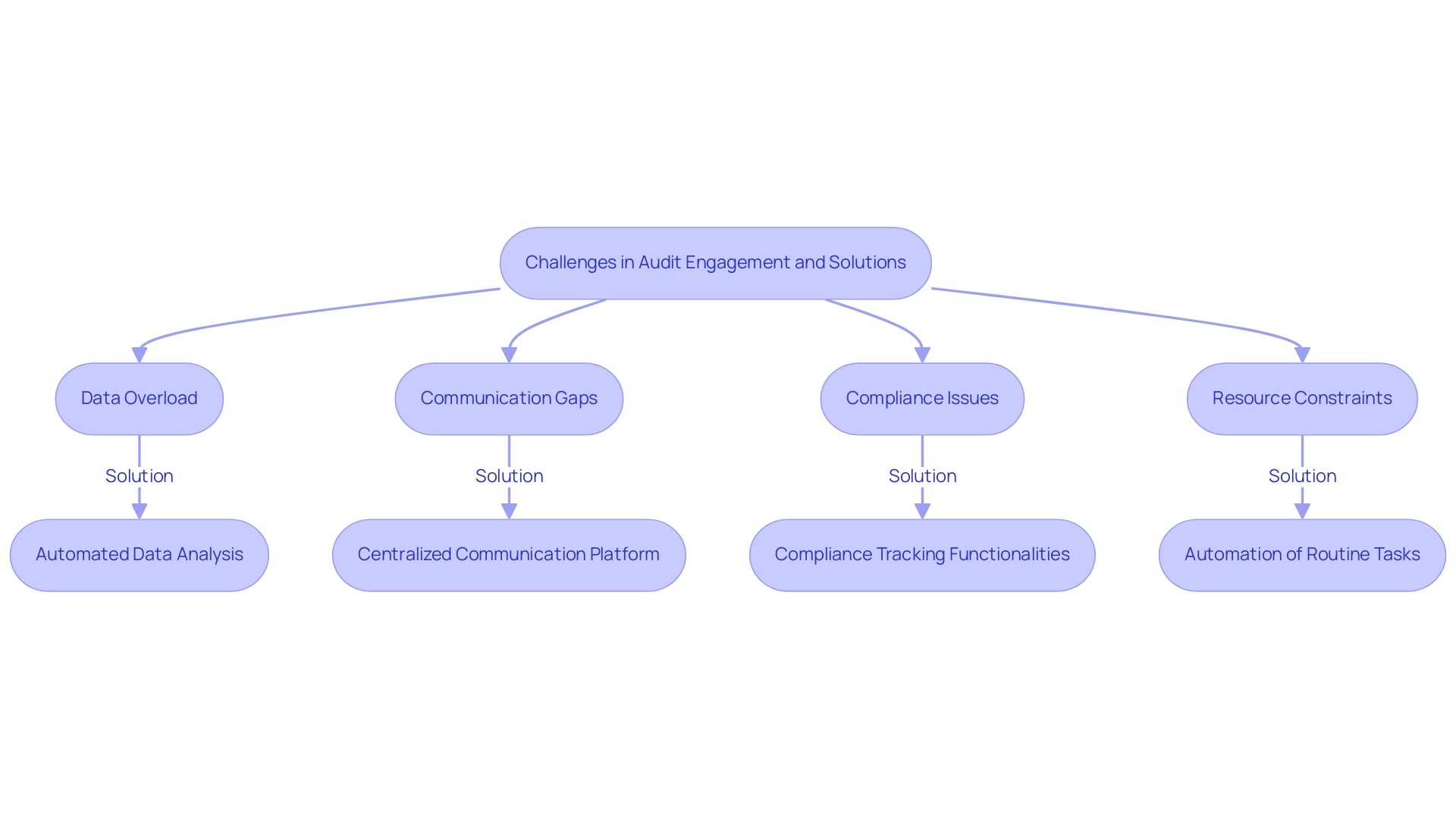
Future Trends in Audit Engagement Software: Embracing AI and Automation
The future of audit engagement software is being transformed by several pivotal trends that accounting managers should be aware of:
- The integration of artificial intelligence into audit engagement software is revolutionising the field by enabling auditors to analyse extensive datasets with unprecedented speed. AI algorithms can identify unusual transactions and generate necessary documentation, enhancing reliability and building client trust. In fact, auditors utilising AI report saving 20-30 minutes when selecting samples, significantly reducing manual workloads and increasing overall efficiency. As noted by Sophie Montgomery from TaxAssist Accountants, firms that have adopted such technologies have experienced substantial time savings, reporting an impressive 288 hours saved in just one tax season.
- Automatisation: Routine tasks—such as data entry and report generation—are increasingly being automated. This solution enhances this trend by replacing manual, time-consuming chases with smart automated reminders, ensuring timely data submission and a smooth workflow. This shift allows auditors to redirect their focus toward strategic activities that require higher-level critical thinking and decision-making. By automating these processes, accounting professionals can ensure a more streamlined workflow and improve service delivery.
- Cloud-Based Solutions: The transition to cloud technology is allowing greater flexibility and accessibility for review teams. Glasscubes’ platform facilitates real-time collaboration, allowing teams to work simultaneously with clients and stakeholders. This collaborative method improves version control and guarantees that all changes are recorded, ultimately resulting in more precise review reports. A notable example is the trend of Real-Time Collaborative Auditing, which demonstrates how cloud solutions improve efficiency by streamlining document sharing and feedback processes.
- Data Analytics: Advanced analytics tools are becoming integral to audit software, empowering auditors to gain deeper insights into financial data. These tools improve risk assessment capabilities, enabling firms to identify potential issues more quickly and efficiently.
- Structured Communication: The platform provides a structured communication tool that helps eliminate confusion from endless email threads. This feature ensures that all interactions are neatly archived and accessible, streamlining information requests and enhancing clarity in communication.
- Security and Compliance: The platform is ISO27001 and GDPR compliant, ensuring that data is secure and encrypted in transit and at rest. This compliance enhances the credibility of the solution, reassuring accounting managers about the safety of their data.
- Pricing Options: This service provides various pricing plans to cater to different needs, with options starting from £120 per month for essential features, allowing firms to choose a plan that best fits their budget and requirements.
By strategically embracing these trends and leveraging audit engagement software such as Glasscubes for automated communication and real-time reporting, accounting managers can position their firms for success in an evolving audit landscape, ensuring they remain competitive and responsive to client needs.
, with sub-branches illustrating specific aspects or benefits of those trends. Each branch represents a key trend in audit engagement software, with sub-branches illustrating specific aspects or benefits of those trends.](https://images.tely.ai/telyai/xtvbccju-each-branch-represents-a-key-trend-in-audit-engagement-software-with-sub-branches-illustrating-specific-aspects-or-benefits-of-those-trends.webp)
Conclusion
In the rapidly evolving landscape of accounting, the choice of audit engagement software stands as a pivotal factor in determining a firm’s operational success. This article has emphasised the transformative impact of tools like Glasscubes, which not only streamline processes but also enhance client engagement and ensure compliance with regulatory standards. By minimizing manual errors, facilitating real-time collaboration, and offering automated features, firms can significantly boost productivity and accuracy, paving the way for improved audit outcomes.
Key features such as user-friendly interfaces, integration capabilities, and robust data security are essential for modern audit engagement software. These functionalities streamline workflows and effectively address common challenges faced by auditors, including data overload and communication gaps. The evidence presented, including compelling case studies and testimonials, reinforces the notion that the right software can lead to substantial time savings and increased client satisfaction.
As the accounting industry embraces technological advancements, integrating AI and automation into audit processes will likely become the standard. Firms that proactively adopt these innovations will not only enhance their operational efficiency but also position themselves as leaders in a competitive landscape. The future of audit engagement is bright; by leveraging the power of advanced software solutions, accounting firms can navigate the complexities of modern auditing while delivering exceptional service to their clients.
